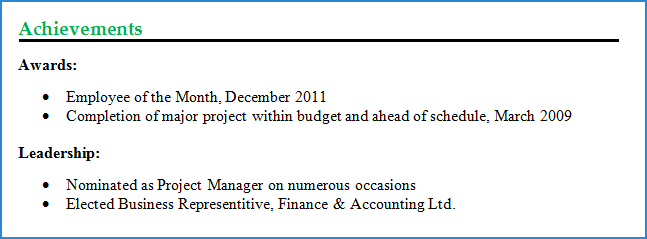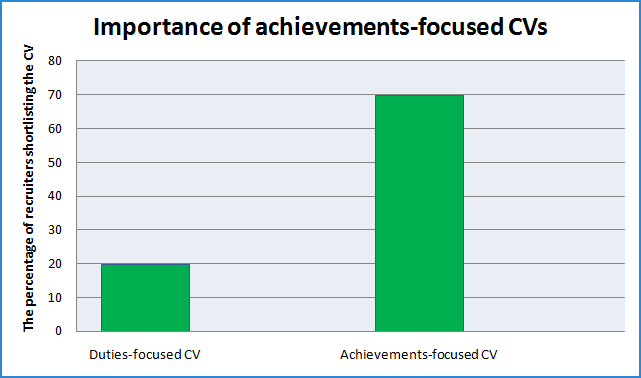 Sobhan Mohmand, Career Expert
Sobhan Mohmand, Career Expert  27 July 2023
27 July 2023
In today’s fiercely competitive job market, your CV only has 30 seconds to impress the employer and secure a job interview.
To be successful, you need to have a well-crafted CV that effectively showcases your skills, experiences and qualifications.
Listing your achievements on your CV is a great way to make your CV more impactful. Your accomplishments are a testimony of your skills, abilities and commitment to succeed in everything you do.
Simon Howard, a career expert and author, states in Creating a Successful CV (pg. 30):
“Straightforward description of what you have done and who you did it for is not enough. The reader must be able to see your record of achievements, and so appreciate what you will be able to do in the future for his or her organisation.”

Use the guide and examples below to write compelling achievement statements to boost your CV and impress hiring managers.
Let’s get started!
Achievement: Any activity, action or task that is accomplished or attained successfully through effort and skill.
Achievements can be divided into two main categories:
They do not include:
Related: Examples of best CV skills to put on your CV
Your previous jobs’ accomplishments and milestones highlight your track record of achieving results and exceeding expectations. They imply that you will be capable of achieving similar results in the future.
There is a well-known saying which states:
“If you want to predict someone’s future, look at their past.”
Employers often seek candidates who have proven their abilities through tangible achievements. By showcasing your past accomplishments on your CV, you provide potential employers with valuable insights into the potential impact you can bring to their organisation, making a compelling case for why you are the ideal candidate for the job.
Julia Gardner, an experienced career coach, said: “Candidates who include achievements in their CV are much more likely to be seen as dynamic, business-aware, high performers and to be viewed as a potential asset rather than a cost.” (You’re Hired, How to Write a Brilliant CV, Mills, C., pg. 36).
A CV that focuses on measurable outcomes and notable contributions instantly captures the attention of hiring managers, setting it apart from CVs that merely list job responsibilities.
By showcasing specific accomplishments, such as exceeding sales targets, implementing cost-saving initiatives or leading successful projects, you present yourself as a strong candidate with the potential to make valuable contributions to their organisation.
According to research conducted by the authors of How to Write a Brilliant CV, achievement-focused CVs are three times more likely to be shortlisted for job interviews compared to duties-focused CVs.

Source: How to Write a Brilliant CV, Bright, J. et al., 2015. pg. 60.
It’s astonishing how frequently we come across people saying,
“But I haven’t accomplished anything…”
The reality is quite the opposite!
Remember, accomplishments do not have to be major to be included in your CV. Any accomplishments that portray you in a positive light and add value to your job application are worthy of being mentioned on your CV, including those that are personal, non-work related.
Corinne Mills, a well-known career expert and HR executive, writes in You’re Hired, How to Write a Brilliant CV (pg.38): “Achievements should be predominantly work related but you can also include non-work activities that are either relevant to the type of role sought or reflect well on you in other ways.”
Personal and professional accomplishments can be many things, including:
* Awards: If it’s not obvious what the awards are for, include a brief explanation. For example, “Justin Turner Award, Birmingham University, 2022: Awarded to the most promising final-year medical students at the university.”
Related: Best personal qualities to put on a CV
Step 1: Decide on the format
There are two primary approaches to including achievements on a CV: one is to create a separate section dedicated solely to highlighting your accomplishments, providing a concise and impactful list of your most significant contributions and successes.
Benefits:
Example:

The Achievements section should be located just after the personal profile statement on the first page of your CV. Check out CV format and layouts for more information about the different layouts you can adopt.
The other option is to scatter your achievements throughout the CV, integrating them into relevant sections such as work experience or education.
For example, educational accomplishments would be listed in the Education section; professional accomplishments would be added in the Employment History section, etc. This format makes it easier for the employer to quickly identify the area in which an achievement is relevant.
Which format should you choose?
Each approach has its advantages, and the choice depends on the specific achievements and the overall structure of the CV. Whether opting for a focused achievements section or integrating them throughout, the key is to present them in a clear, quantifiable, and compelling manner to demonstrate your value and capabilities as a candidate.
Step 2: Identify your achievements
Now, it’s time to identify and compile a list of your achievements, encompassing various aspects of your life such as education, work, volunteer experiences, personal projects and extracurricular activities.
Think back on some important moments of your life and find instances which made you proud and happy about your performance. Identify instances where you made a significant impact, improved performance, improved processes, introduced new ideas, demonstrated exceptional skills, received recognition or awards, successfully overcame challenges, solved problems or contributed to the success of a team or organisation.
Don’t underestimate seemingly small accomplishments, as they can still showcase valuable qualities and demonstrate your capabilities!
Step 3: Prioritise
Next, you need to prioritise which achievements to add to your CV.
Ask yourself the following questions:
When making your selection, remember to only include up to 3-4 accomplishments in the achievements section. If you list any more than that it will take up valuable space and look cluttered. You can, however, include any additional examples in the various other sections of your CV.
Tip: Use a variety of personal accomplishments as that will make you look like an all-rounded person. For example, do not include three examples from employment alone but also include personal and academic achievements.
Step 4: Write effective achievements statements
Finally, you now need to turn your list of prioritised achievements into effective achievement statements to impress employers.
Guidelines:
Examples of business achievements
Examples of student/teenager achievements
Examples of personal accomplishments
Example of an achievements section of a CV:

Listing your achievements on your CV is a great way to make your CV stand and portray yourself as a strong and accomplished candidate.
Your accomplishments provide solid evidence of your skills, abilities and contributions, allowing recruiters to gauge your potential impact within their organisation.
Examples of achievements include exceeding sales targets, leading successful projects, implementing cost-saving measures, receiving awards and recognition, and achieving academic or personal milestones.
To maximise the impact of your CV, always emphasise the value of your attainments. Use strong action verbs to describe them and ensure your statements remain concise and clear.
With a tailored and achievement-focused CV, you’ll make a lasting impression on potential employers and increase your chances of landing your dream job.
Good luck with your job search!